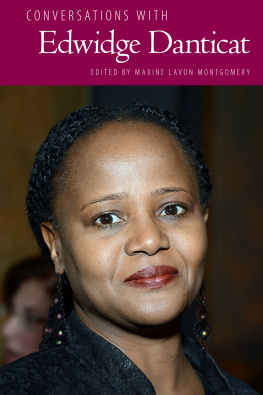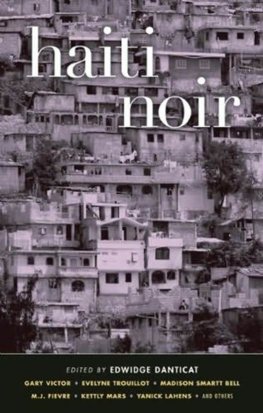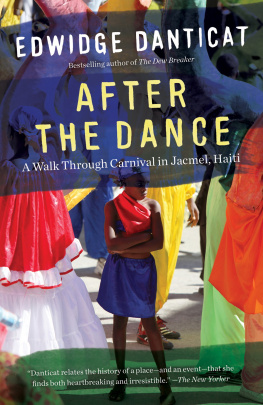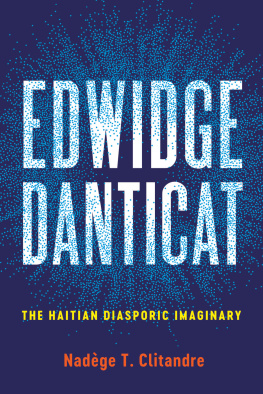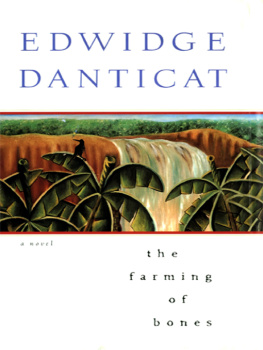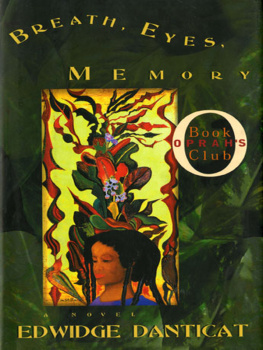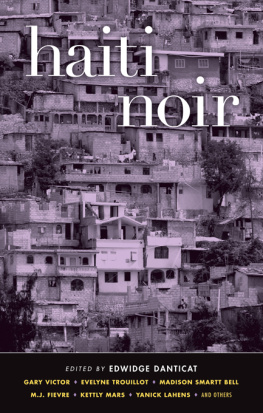
Conversations with Edwidge Danticat
Literary Conversations Series
Monika Gehlawat
General Editor
Conversations with Edwidge Danticat
Edited by Maxine Lavon Montgomery
University Press of Mississippi / Jackson
www.upress.state.ms.us
The University Press of Mississippi is a member of the Association of American University Presses.
Copyright 2017 by University Press of Mississippi
All rights reserved
Manufactured in the United States of America
First printing 2017
Library of Congress Cataloging-in-Publication Data
Names: Danticat, Edwidge, 1969author. | Montgomery, Maxine Lavon, 1959 editor.
Title: Conversations with Edwidge Danticat / edited by Maxine Lavon Montgomery.
Description: Jackson : University Press of Mississippi, 2017. | Series: Literary conversations series | Includes bibliographical references and index. |
Identifiers: LCCN 2017006309 (print) | LCCN 2017025177 (ebook) | ISBN 9781496812568 (epub single) | ISBN 9781496812575 (epub institutional) | ISBN 9781496812582 ( pdf single) | ISBN 9781496812599 (pdf institutional) | ISBN 9781496812551 (hardback)
Subjects: LCSH: Danticat, Edwidge, 1969 Interviews. | Authors, American20th centuryInterviews. | Haitian American authorsInterviews. | BISAC: BIOGRAPHY & AUTOBIOGRAPHY / Literary. | LITERARY CRITICISM / Caribbean & Latin American. | LITERARY CRITICISM / American / African American. | SOCIAL SCIENCE / Black Studies (Global).
Classification: LCC PS3554.A5815 (ebook) | LCC PS3554.A5815 Z46 2017 (print) | DDC 813/.54 [B] dc23
LC record available at https://lccn.loc.gov/2017006309
British Library Cataloging-in-Publication Data available
Works by Edwidge Danticat
Novels
My Turn in the Fire: An Abridged Novel. MFA thesis, Brown University, 1993.
Breath, Eyes, Memory. New York: Soho Press, 1994; New York: Vintage Books, 1995; New York: Soho Press, 2015.
The Farming of Bones. New York: Soho Press, 1998; Penguin, 1999.
The Dew Breaker. New York: Knopf, 2004.
Claire of the Sea Light. New York: Knopf, 2013.
Short Story Collection
Krik? Krak! New York: Soho Press, 1995; New York: Vintage Books, 1996.
Memoir
Brother, Im Dying. New York: Knopf, 2007.
Young Adult Literature
Behind the Mountains: The Diary of Celiane Esprance. New York: Orchard Books, 2002.
Anacaona, Golden Flower. New York: Scholastic, 2005.
Climne, Fairytale for the Daughter of Immigrants. Trans. Stanley Pan. Montral: Mmoire dencrier, 2009.
Eight Days. London: Orchard, 2010.
The Last Mapou. Brooklyn: One Moore Book, 2015.
Mamas Nightingale: A Story of Immigration and Separation. New York: Dial Books, 2015.
Untwine. New York: Scholastic, 2015.
Translation
In the Flicker of an Eyelid. Trans., Lespace dun cillement by Jacques Stphen Alexis. Trans. with Carrol F. Coates. Charlottesville: University of Virginia Press, 2002.
Nonfiction
Women: A Celebration of Strength. Ed. with Louise A. Gikow, Kathy Rodgers, Lynn Hecht Scghafran, and Anna Quindlen. New York: Legal Momentum, 2007.
Create Dangerously: The Immigrant Artist at Work. Princeton: Princeton University Press, 2010.
Contents
Alexander Laurence / 2000
Robert Birnbaum / 2004
Katharine Capshaw Smith / 2005
E. Ethelbert Miller / 2007
Opal Palmer Adisa / 2009
Rose Marie Berger /2010
Lloyd Kam Williams / 2010
Thomas Spear / 2010
Paul Holdengrber /2010
Jennifer Ludden / 2010
Nathalie Handal / 2011
Carolyn Gan /2011
Kimberly Nagy and Lauren McConnell /2012
Kreyolicious / 2012
Rachel Martin / 2013
Dwyer Murphy / 2013
Brendan Dowling / 2013
Kima Jones / 2014
Richard Andr / 2014
Josephine Jo Reed / 2015
Kreyolicious / 2015
Maxine Lavon Montgomery / 2016
Introduction
Edwidge Danticat appeared on the literary scene when she was only twenty-five years old with Breath, Eyes, Memory (1994), a semi-autobiographical novel that has its genesis in a newspaper article about a young Haitian girl who leaves the Caribbean and comes to America in order to be reunited with her parents. That article became the essence of a short story that Danticat later expanded into novelistic form, a genre that has served the author well during her decades-long writing career. Four years after the publication of her debut work of fiction, the novels inclusion as an Oprah Winfrey Book-of-the-Month Club selection not only guaranteed the commercial success of that work, it also helped to lay the groundwork for what would become a stellar literary vocation.
At the outset of that career, it was evident that Danticat was indeed poised on the brink of a bright, promising futureone that would catapult her into the global spotlight as a clarion voice for the twentieth- and twenty-first-century creative artist and intellectual. Danticat remarks enthusiastically in an interview regarding Winfreys selection of the authors first novel that everything changed.Haitian Creole, she chooses to write in English, a language that accentuates the trilingual nature of her compound identity as the daughter of Haitian migrants to the United States. Her novels and short stories have been translated widely into Japanese, Korean, German, Italian, Spanish, Swedish, as well as French.
The interviews assembled in this collection coincide with Danticats evolving artistic vision, steady book production, and expanding role as fiction writer, essayist, memoirist, documentarian, young adult book author, editor, song writer, cultural critic, and political commentator over the course of a long and auspicious career that shows no sign of decline. With each endeavor, she is mindful of the need to tell a nuanced story, her version of the truth. One thinks of Jhumpa Lahiri, Azar Nafisi, Vladimir Nabokov, Christina Garcia, Chinua Achebe, Gabriel Garca Mrquez, Jamaica Kincaid, Paule Marshall, and the Dominican-born Junot Daz. What sets Danticat apart from this distinguished assembly of writers is her penetrating acquaintance with the Haitian-immigrant record and the uneasy truce between that life and the history, politics, and culture of the West. She lends her uniquely individual voice to the telling and retelling of a recognizable story at the center of diasporic culture and literature, a narrative involving the migrants often thorny encounter with issues of longing and belonging, migration and displacement, diasporic and national self-identification, exile and the perpetual quest for home.
The many interviews that Danticat has granted attest to not only her productivity, but also her accessibility to scholars, teachers, creative writers, and journalists eager for knowledge about her life, art, and political vision. Whether those interviews assume the form of a structured face-to-face exchange, an email interview, or a vigorous informal conversation between two creative writers, they underscore her responsibility as both literary craftsperson and political commentator on a range of issues confronting the twentieth- and twenty-first-century world. Included in this volume are interviews covering the publication of her debut work of fiction, to a personal interview that I conducted with the author in 2016. In my conversation with Danticat, which appears for the first time as part of this collection, I was especially interested in accessing little-known details regarding her work, recent political events, as well as her next project. Because the interviewers frequently pose the same questions, some level of repetition and overlap inevitably ensues. Throughout the course of the interviews assembled in this volume, however, Danticat expands upon her answers rather than contradicting earlier remarks. But the development of the authors views manifests itself in her willingness to take up a broader range of issues and amplify previous comments in ways that reflect her careful rethinking of predominant concerns, especially her beliefs regarding the younger generations role in perpetuating cultural traditions of the past and ushering in a better future. Therefore, the evolution from
Next page
